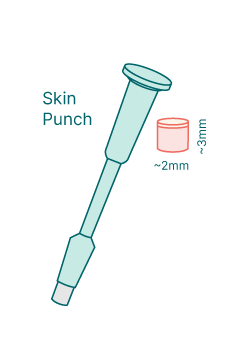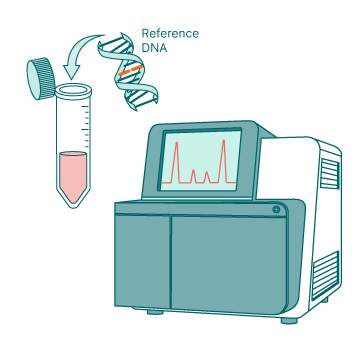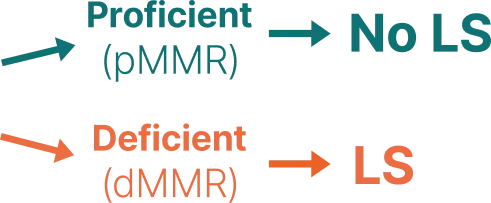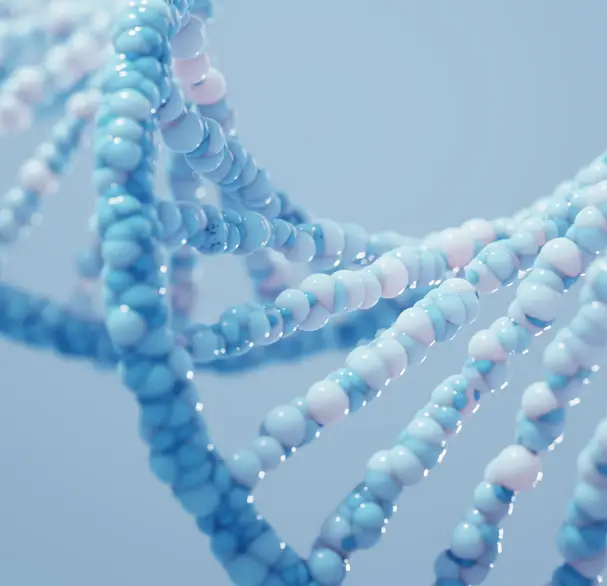Finally Find an Answer for You and Your Family
When you get an answer about Lynch syndrome, you can get a head start on prevention strategies and ahead of early signs of cancer.
Find your next step today.
When you get a clear answer about Lynch syndrome, you can get a head start on prevention strategies and ahead of early signs of cancer.
Find your next step today.

Lynch syndrome, caused by an inherited mismatch repair (MMR) deficiency, is a genetic condition that increases the risk of developing certain types of cancer, primarily colorectal cancer and endometrial cancer.
Know your & your family’s risk
Lynch syndrome is inherited with 50% probability1 within affected families. Here’s what you need to know.When should I get tested?
If someone in your family has tested positive for Lynch syndrome or your healthcare provider has identified you at high risk of having Lynch syndrome, you should get tested.
Please consult with your doctor if you have concerns.
How do I get tested?
Traditional Lynch syndrome testing includes microsatellite instability tumor testing and DNA sequencing. Lynsight’s test, DiagMMR, is a new approach that provides exceptionally high fidelity results.
I’m positive for Lynch syndrome. now what?
A Lynch syndrome diagnosis puts you and your family on a proven path of screenings and beneficial lifestyle changes. Here are two important next steps.

Talk to your
healthcare provider
Schedule an appointment with your healthcare provider to discuss your diagnosis, explore personalized screening strategies, and develop a comprehensive care plan tailored to your needs.
Talk to
your family
Open and honest communication with your relatives about your diagnosis can empower them to make informed decisions about their own health. Together, you can take proactive steps to protect your family’s health for generations to come.

Accurate Lynch Syndrome Testing
for You & Your Family
If you or a loved one needs to be tested for Lynch syndrome, the process can feel overwhelming. Many traditional tests rely on indirect markers, which can lead to inconclusive results and uncertainty. This can leave you and your family without clear answers or a definite path forward.
Lynsight is changing that with DiagMMR, a new approach that provides higher fidelity results. Instead of looking for clues, this test directly measures how well your body’s MMR system is functioning. Here’s how it works.

Step 01
A Small Skin Sample
Instead of complex procedures, DiagMMR starts with a quick and simple skin punch biopsy from your inner forearm. This tiny sample contains skin cells that will be studied in the lab.

Step 02
Growing the Cells
Once collected, the skin cells are placed in a special environment that helps them grow. Over two weeks, the cells multiply so there are enough to test.

Step 03
Checking DNA Repair Ability
Scientists take the grown cells and extract the proteins responsible for DNA repair. These proteins are then tested to see how well they can fix damaged DNA – which is essential for preventing cancer.

Step 04
Analyzing the Results
Using a high-precision algorithm, the test measures how efficiently the MMR system repairs DNA. This helps determine whether the person’s cells have a healthy repair system or a deficiency.

Step 05
Getting a Clear Answer
DiagMMR determines MMR function and reports results qualitatively as either "normal" or "reduced." To maintain the highest level of accuracy, DiagMMR follows rigorous quality standards and international industry guidelines. Results are provided to healthcare professionals, who interpret them within the broader diagnostic process.


